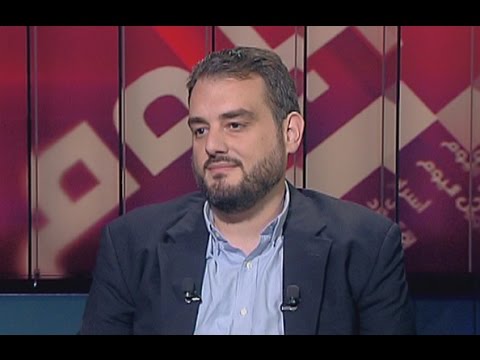Sanctions on Hezbollah a reminder of what may unfold for Lebanon
العقوبات على حزب الله تذكير بما قد تصل إليه الأمور في لبنان
Makram Rabah/Asharq Al Awsat/May 30/18
The recent Lebanese parliamentary elections was not merely an occasion for selecting parliamentary representatives as it also underscored the inability of the Lebanese political elite to contain Iran and Hezbollah’s hegemony over the Lebanese state.
Iran’s foothold on the Mediterranean coast was never essentially the outcome of the ballot boxes but rather a combination of both political alliances primarily with the Maronite president of the Republic Michel Aoun and his party the Free Patriotic Movement (FPM) and a calculated use of its weapons to paralyze and intimidate their opponents when needed.
Consequently, the recent US-Arab Gulf sanctions on Hezbollah were somewhat expected or even inevitable, given progression of the events that have been unfolding in the region and Hezbollah’s leading and effective role in implementing Iran’s expansionary vision.
Yet these thoroughly coordinated sanctions between the Trump administration and the Terrorist Financing Targeting Center (KSA, Bahrain, UAE, Kuwait, Oman, and Qatar) mark the emergences of a stricter Iranian containment policy to counteract and ultimately abolish the failed appeasement policy of the Obama doctrine.
These recent sanctions as well as the scrapping of the Iranian nuclear deal are a stark reminder that Iran’s menacing threat goes beyond its nuclear and ballistic missile programs.
Both the US government as well as the Arab states have warned of the activities of Iran’s Revolutionary Guards, the Quds Force, that fund and control and assortment of militias chiefly amongst them Hezbollah who are sides in the sectarian violence and instability engulfing the region.
Recent sanctions as well as the scrapping of the Iranian nuclear deal are a stark reminder that Iran’s menacing threat goes beyond its nuclear and ballistic missile programs
Timing of sanctions
Equally important is the timing of these sanctions that coincide with the impending formation of the next Lebanese government, most likely be led by current PM Saad Hariri.
Consequently, the designation of both of Hezbollah’s military and political wing as terrorist entities and the placing of five of its top political brass, including its General Secretary Hassan Nasrallah and his deputy Naim Kassem on the sanctions list is a clear warning to Hariri and to the Lebanese state of the new perimeters that should govern the upcoming phase.
Hence, if Hariri, Aoun, and the Lebanese state by extension wishes to stay within the fold of the Arab consensus or even continue to keep their commitment to the disassociation policy it has adopted, the forthcoming cabinet cannot house any members of Hezbollah or allow Hezbollah to partake in the executive branch of government.
Propagated by many local and European factions this political heresy of distinguishing between Hezbollah’s political and military activities has allowed it to continue to masquerade as a grassroots national entity that claims to be representative of the hopes and aspirations of the majority of the Lebanese Shiites.
Now with the abolition of this dichotomy, neither the Lebanese government nor the hordes of European diplomats’ eager to please Hezbollah can continue to whitewash the image of Hezbollah, nor peddle the notion that Iran’s behavior has improved over the last 3 years, since the Iranian nuclear deal took effect.
Restrictive or punitive?
To many the sanctions are mistakenly perceived as restrictive or rather punitive measures on the Lebanese state. In fact, they are an opening for Saad Hariri to possibly dislodge Hezbollah from the cabinet, not merely, because he or the Lebanese at large wish to do so but rather to avoid the economic repercussions of refraining to do so.
Furthermore, these sanctions will place further burdens on President Aoun and the FPM who have since 2006, after signing the famous memorandum of understating with Hezbollah, provided it with a Christian ally anxious to shamelessly defend its arsenal as beneficial and even imperative to the protection of Lebanon.
While the sanctions might obviously involve Lebanon and its hapless government, and is certain to bring forth more financial restrictions on the Lebanese banking sector, in reality the crux of the whole US-Arab policy is not Lebanese centric, but rather part of a wider policy.
Since 2005, the unchecked Iranian influence in the region has thrusted Hezbollah into a more cross-regional role; and consequently these sanctions are an attempt to confront this reality and ultimately change it.
As a result, for Lebanon to survive in these tumult regional times, the various Lebanese political factions, even Hezbollah, should not treat these sanctions as merely an opportunity to gain or loss more seats in the cabinet, but rather as a chance to reassess Lebanon’s position in an ever-changing region.
Placing Hezbollah’s senior leadership will certainly not affect their ability to use their credit cards, it they originally have any, to shop or to settle an online bill. Nevertheless, it is a stark reminder that for those who actually care about their financial future and their businesses, this sanctions list will only grow thus testing the resolve and loyalty of anyone to claiming support to Hezbollah, including the FPM.




















